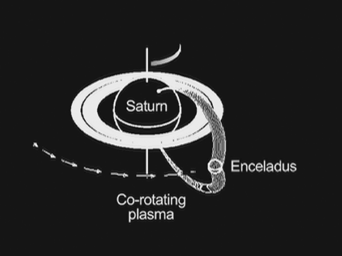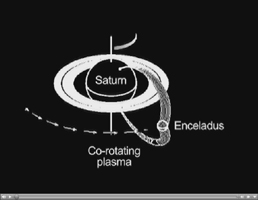
|
Saturn and Enceladus Electrical Link
- Click the image above for a larger view
 Movie Download Options
Movie Download Options- Full-Res JPEG (640 x 479) (19.1 kB)
- Full-Res TIFF (640 x 479) (307.1 kB)
Caption:

Click on the image for the movie
This animated graphic shows how Saturn and its moon Enceladus are electrically linked. Magnetic field lines, invisible to the human eye but detectable by the fields and particles instruments on NASA's Cassini spacecraft, arc from Saturn's north polar region to south polar region. Enceladus resides in the arc of a set of the field lines and feeds charged particles into the Saturn atmosphere.
As Enceladus orbits around Saturn, the "footprint" of its connection to Saturn's north polar region, visible in ultraviolet light, also rotates. A doughnut of plasma, or hot ionized gas, revolves around Saturn at the same pace as the planet turns. The interaction of this plasma cloud with Enceladus shoots electrons along the magnetic field lines into the polar region of Saturn. The rain of electrons into Saturn's atmosphere creates an ultraviolet glow in an aurora-like phenomenon.
Cassini's radio and plasma wave science instrument has detected a "hiss-like" radio noise generated by electrons moving along magnetic field lines from Enceladus to the glowing patch of ultraviolet light on Saturn.
Background Info:
The Cassini-Huygens mission is a cooperative project of NASA, the European Space Agency and the Italian Space Agency. NASA's Jet Propulsion Laboratory, a division of the California Institute of Technology in Pasadena, Calif. manages the mission for NASA's Science Mission Directorate, Washington, D.C. The radio and plasma wave science team is based at the University of Iowa, Iowa City.
For more information about the Cassini-Huygens mission visit http://www.nasa.gov/saturn and http://www.nasa.gov/cassini .
Cataloging Keywords:
| Name | Value | Additional Values |
|---|---|---|
| Target | Enceladus, Saturn | |
| System | Saturn | |
| Target Type | Satellite | Planet |
| Mission | Cassini-Huygens | |
| Instrument Host | Cassini Orbiter | |
| Host Type | Orbiter | |
| Instrument | Radio and Plasma Wave Science Instrument (RPWS) | |
| Detector | ||
| Extra Keywords | Atmosphere, Magnetosphere, Movie, Radio, Rotation, Ultraviolet | |
| Acquisition Date | ||
| Release Date | 2011-04-20 | |
| Date in Caption | ||
| Image Credit | NASA/JPL/University of Iowa | |
| Source | photojournal.jpl.nasa.gov/catalog/PIA13897 | |
| Identifier | PIA13897 | |
